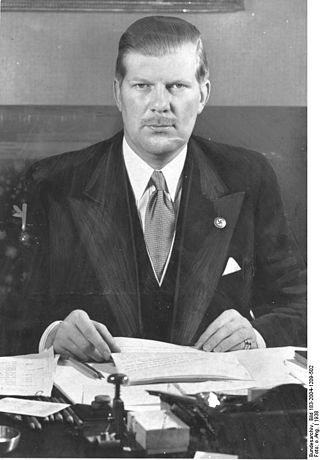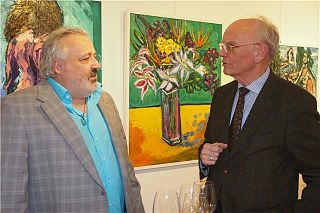
Michael Breisky (born 29 December 1940 in Lisbon) is a former Austrian diplomat and, as a globalization critic, is the author of numerous publications on Leopold Kohr and his teaching.

Michael Breisky (born 29 December 1940 in Lisbon) is a former Austrian diplomat and, as a globalization critic, is the author of numerous publications on Leopold Kohr and his teaching.
The Breisky family belonged to Austrian nobility. Part of the family bore the title of baron, another the title of knight, from whom Michael Breisky also comes. One of his relatives was the politician Walter Breisky, once chancellor of Austria. Michael Breisky grew up as the son of Hubert von Breisky and his wife Hildegard (née Schmidtmann) in Lisbon, where his father was cultural attaché to the German legation from 1940 to 1945. [1] In 1949 he moved to Austria with his mother.
Michael Breisky studied law in Vienna (Dr. iur.) and graduated from the Diplomatic Academy of Vienna. In 1967 Breisky became an employee of the Foreign Service of the Austrian Foreign Ministry. His first foreign posts were in Rio de Janeiro, Oslo and Nairobi. In 1982 Breisky advanced to the position of Austrian consul general in Milan, responsible among other things for South Tyrol. Afterwards he worked, among other things, as head of the South Tyrol department in the Austrian Foreign Ministry and, as chairman of the Austrian commission to examine the "package" on the autonomy of South Tyrol, was instrumental in the amicable settlement of the 1992 South Tyrolean conflict. [2]
Michael Breisky was the Austrian ambassador to Ireland from 1993 to 1999. He then became head of the American Department in the State Department and in 2003 Consul General in New [3] In 2005, Breisky ended his diplomatic career.
His occupation and expertise in questions of minority protection, autonomy, regionalism and ethics led Breisky to an intensive examination of the ideas of Leopold Kohr even before his retirement, and to the (co-) establishment of the scientific advisory board of the Leopold Kohr Academy in Salzburg. [4] In 2008, Breisky accepted the invitation to a lecture tour on Leopold Kohr at six Chinese universities.

Austrian German, Austrian Standard German (ASG), Standard Austrian German, Austrian High German, or simply just Austrian, is the variety of Standard German written and spoken in Austria and South Tyrol. It has the highest sociolinguistic prestige locally, as it is the variation used in the media and for other formal situations. In less formal situations, Austrians use Bavarian and Alemannic dialects, which are traditionally spoken but rarely written in Austria. It has been standardized with the publishing of the Österreichisches Wörterbuch in 1951.

Frederic-Hans von Rosenberg was a German diplomat and politician. He served as Reichsaußenminister in the cabinet of Wilhelm Cuno in 1922–1923.

Herbert Hunger was an Austrian Byzantinist, palaeographer and university professor. He was an influential specialist in Byzantine literature, particularly of the secular vein.

Emil Brix is an Austrian diplomat and historian.

Karl Heinz is an Austrian architect. With two colleagues, as the firm Heinz & Mathoi & Streli, he built private homes in the alpine landscape of Tyrol, schools, offices and public buildings, among others.

Gerald Lehner is an Austrian journalist and author.
Fritz Schachermeyr was an Austrian historian, professor at the University of Vienna from 1952 until retirement.
Alfred Polgar was an Austrian-born columnist, theater critic, writer and occasionally translator.

Hieronymus Megiser was a German polymath, linguist and historian.

Alexander Freiherr von Dörnberg zu Hausen was a German jurist, diplomat and SS officer. He was head of the Protocol Department of the Foreign Office from 1938 to 1945.

Helmuth Gräff is an Austrian painter, drawer and poet. Gräffs painterly style is rooted on the one hand in the artistic heritage of Vincent van Gogh, and on the other hand he can also be regarded as a precursor or heritage of the Neuen Wilde.
Carltheo Zeitschel also Carl Theo,, was a German physician, diplomat, Nazi functionary and SS-Sturmbannfuhrer (major).
Otfried Deubner was a German classical archaeologist and diplomat. During World War II, Otfried Deubner worked as a linguist in Pers Z S, the signals intelligence agency of the German Foreign Office.

Carmella Flöck was a courier for the Austrian Resistance during the Anschluss of 1938-1945. She was a survivor of the Ravensbrück concentration camp.

Fritz von Herzmanovsky-Orlando (1877–1954) was an Austrian writer and illustrator.
Sibylle von Bolla-Kotek was an Austrian scholar of legal history and the first female professor in a legal faculty in Austria.
Ekkehard Tertsch was a Spanish-Austrian journalist and a Nazi Germany diplomat.
Wilhelm Litten was a German diplomat, orientalist, writer and translator. During his time as a dragoman at the German Embassy in Tehran, he collected materials from which he developed regional, cultural and economic history studies. During World War I, in early 1916, he witnessed the death marches of Armenians in the Ottoman Empire. His report, The Path of Horror, is a source on the Armenian genocide. After the war, Litten continued to work in the diplomatic service. From 1920 to 1924 he was consul in Libau and from 1928 in Baghdad, as well as chargé d'affaires of the German Reich, thereafter establishing diplomatic relations with Iraq.

Murray G. Hall was a Canadian Germanist and specialist in literature.